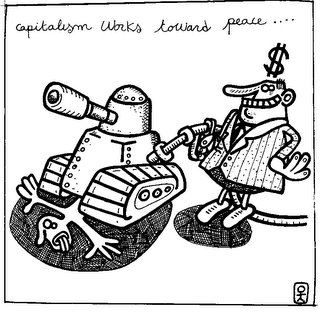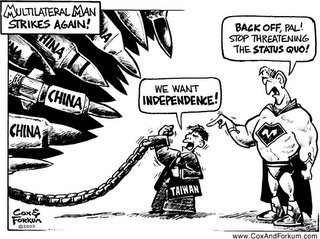
Again another long hiatus has come to an end.
Taiwan is consistently held up by laissez-faire promoters of globalisation as a fine example of a country which has benefited from global capitalism. Through the 80's and then into the 90's as an "Asian Tiger" Taiwan flourished. Taiwan's economy grew and as the country developed economically the government reformed from a one party state into a democratic society. As a model of export-based growth (remarkable for a country with few, if practically no natural resources) and a country that made a smooth transition to democratic rule Taiwan was the envy of many countries of the world. Taiwan had distinguished itself on the world stage.
It must be pointed out however that Taiwan flourished under a global capitalist system which for the most part had yet to fully integrate the huge market that China offers as well as having developed under a regime that received preferential treatment from its former main export market, the US, and strong protectionist measures and subsidies for key industries.
What the cutthroat God of global capitalism giveth so can he taketh away.

Today, Taiwan is not as well off as it once was. Taiwan's economy is being hollowed out as manufacturing moves to China to take advantage of cheaper labour and gain a foothold in the future huge Chinese market to better compete with western and other regional companies.
While Taiwan still maintains economic growth that is higher than most of the developed countries Taiwan's economic development will likely slow. Taiwanese companies and capital have flooded into China over the past decade despite President Chen Shui Bian's "Go South" policy of encouraging Taiwanese companies to invest in SouthEast asian countries.
Is this wave of capital/production shift to China surprising? Certainly not. Pan-Blue businessmen see moving to China as a way of getting power back in a country which was once theirs. With the huge wave of investment that has swept into China other companies simply see it as necessary in order to maintain competitiveness in a global environment. Is it likely that Taiwanese businesses would want to ignore the ease of communication that comes with setting down in China vs. Vietnam or Thailand, not to mention the disciplined workforce and access to a large pool of highly educated workers? I don't think so.

This wave of investment in China, has been accompanied by a new managerial class of Taiwanese workers that oversee Chinese operations by either basing themselves in China or making regular lengthy business trips, weeks or months at a time. In a weird resurrection of the Chinese practice of taking concubines some of these commuting managers even have second wives/families in China.
Taiwan is creating ever stronger connections with China. Global capital moves easily in today's world and the security of capital may be at odds with the security of a nation. Taiwan knows this well but does it know what to do?
It is Taiwanese capital which first fuelled the Chinese economy and provided the seeds of investment/economic growth to help generate the funds needed to fuel the equally rapid expansion of the Chinese military. The rapid growth of Taiwanese investment in China and the rapid Chinese military build up are putting the pinch on Taiwan's options. Under a weakened China and a strong place in the international economic system Taiwan stood strong and developed its democracy. Under the current conditions Taiwan is weakening and the island's democracy is showing early cracks.
Taiwan is now stuck in the unenviable position of having a dysfunctional government that is crippled due to an inept constitution. The Pan-Blue, pro-unificationist power maintains legislative control while the executive is controlled by the DPP-independence minded party. The Pan-Blue see the writing on the wall for Taiwanese economic power and the need for unification with China to truly help Taiwanese businesses take advantage of their early positions within China. If this doesn't happen there is the likelihood that in the long run Taiwanese businesses will lose a competitive edge. Through recent legislative proposals the Blues seem increasingly willing to sign Taiwan on to the idea of unity with China without any appeal to the voting masses. On the other hand the DPP maintains a more nationalistic stance that places the idea of Taiwanese nationhood/independence and the newly developed democratic rights above its economic power and maintains that Taiwan can remain strong economically and be more independent.
Time will tell who will win. In the meantime I think everyone must recognise the paramount importance that the all mighty dollar(yuan?) has in the global world and the difficulty of balancing national and economic security.
In the years to come we will find out if Taiwan is a country that worships many Gods including the relatively new Taiwanese God of 'democracy' or whether Taiwan is simply a "moneytheistic' society.









